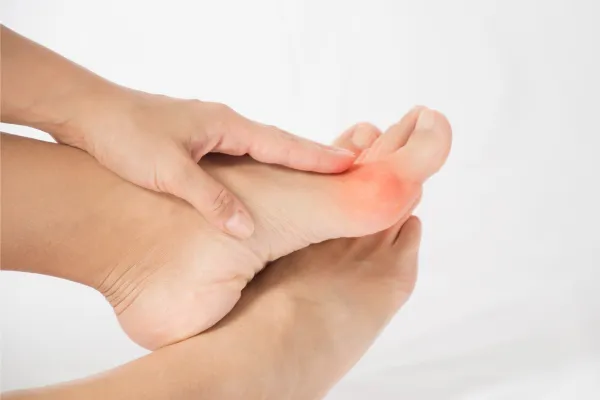Tips & Advice From Foot & Ankle Associates of Southern NH

The Role of Arthritis in Bunion Formation: How Joint Health Affects Your Feet
Arthritis is a common condition that affects millions of people worldwide, and it plays a significant role in the development of bunions. Bunions are often thought of as a cosmetic foot issue, but in reality, they can cause pain, misalignment, and long-term damage to the foot’s joints. At Foot and Ankle Associates of Southern NH, we understand the intricate connection between arthritis and bunions, and how joint health impacts the formation and progression of this deformity.
What Are Bunions?
A bunion is a bony bump that forms at the base of the big toe, causing the toe to lean toward the second toe. This misalignment of the joint can lead to pain, swelling, and difficulty finding comfortable footwear. Bunions develop over time due to a combination of factors, including genetics, ill-fitting shoes, and, notably, arthritis.
The Link Between Arthritis and Bunions
Arthritis, particularly osteoarthritis and rheumatoid arthritis, can contribute significantly to the development of bunions. Here's how:
Osteoarthritis
Osteoarthritis occurs when the cartilage in the joints breaks down, causing pain, swelling, and stiffness. In the case of the big toe joint (the first metatarsophalangeal joint), the loss of cartilage can lead to bone-on-bone contact. This results in the joint becoming misaligned and the toe gradually turning inward, leading to the formation of a bunion. As the condition progresses, the pain and swelling from arthritis can make the bunion more pronounced.Rheumatoid Arthritis
Rheumatoid arthritis is an autoimmune disease that causes widespread inflammation in the joints, including those in the feet. When the joints in the feet are inflamed, the tendons and ligaments surrounding them become weakened, leading to a loss of structural integrity. This instability can cause the big toe joint to shift, contributing to bunion formation. Over time, the inflammation caused by rheumatoid arthritis can lead to joint deformities, including bunions.Joint Degeneration
Both types of arthritis can cause degeneration of the joints, which disrupts their normal functioning. As the joint becomes more damaged, the bones may shift in a way that promotes the development of bunions. The abnormal pressure from the misaligned bones and the loss of joint stability further worsen the deformity.
How Arthritis Accelerates Bunion Progression
When arthritis affects the big toe joint, it leads to several changes in the foot's mechanics that can accelerate the progression of a bunion:
Inflammation and Pain: Arthritis-related inflammation increases the pressure in the big toe joint, making it harder to move and causing pain. This can lead to the toe shifting further out of alignment, exacerbating the bunion.
Muscle Weakness: As arthritis weakens the muscles and ligaments around the affected joint, the big toe may no longer be able to maintain its normal position. This loss of support increases the chances of the bunion worsening.
Joint Instability: The instability caused by arthritis means the bones are more likely to move in ways that contribute to the formation and worsening of bunions, increasing the risk of developing additional foot problems.
Managing Arthritis-Related Bunions
While you can’t reverse arthritis or the bunion once it forms, there are several treatments available to manage both conditions and relieve pain. Here are some options:
Custom Orthotics
One of the most effective ways to manage bunions related to arthritis is with custom orthotics. These shoe inserts are designed to provide better foot alignment, support the arch, and reduce the pressure on the big toe joint, which can help slow the progression of the bunion and alleviate discomfort.Footwear Modifications
Wearing shoes that have a wide toe box, good arch support, and a low heel is essential for people with bunions. Proper footwear can help relieve pressure on the bunion and reduce pain caused by arthritis. Avoid tight, narrow shoes that exacerbate the deformity.Anti-Inflammatory Medications
Nonsteroidal anti-inflammatory drugs (NSAIDs) can help reduce inflammation in the joints and alleviate pain. For patients with rheumatoid arthritis, disease-modifying antirheumatic drugs (DMARDs) may be prescribed to slow down the progression of the disease.Physical Therapy
Targeted physical therapy exercises can help strengthen the muscles around the big toe joint, improving its stability and reducing the strain on the affected area. Stretching exercises can also help alleviate tightness and improve range of motion.Surgery
In severe cases where the bunion and arthritis cause significant pain or disability, surgery may be recommended. Procedures can involve realigning the bones, removing the bunion, or even replacing the affected joint with a prosthesis.
Conclusion
Arthritis plays a critical role in the development and worsening of bunions, particularly in those with osteoarthritis or rheumatoid arthritis. The inflammation, pain, and joint instability caused by these conditions can lead to misalignment in the feet, resulting in bunions that worsen over time. At Foot and Ankle Associates of Southern NH, we offer comprehensive treatment options to help manage arthritis-related bunions, providing relief from pain and improving mobility.
If you're dealing with arthritis or bunions, don’t hesitate to contact us to learn more about treatment options that can help improve your foot health and overall quality of life.
Ask Foot & Ankle Associates of Southern NH And Their Team
Fill in the form to request a call from our team. One of our team members will call you for FREE and answer any questions or concerns you may have about your condition
Where To Find Foot & Ankle Associates of Southern NH

If you have any questions before scheduling an appointment or for general inquiries, please use the contact us button below. Our team will promptly reach out to assist you.
Opening Hours
Monday: 8:00am – 5:00pm
Tuesday: 8:00am – 5:00pm
Wednesday: 8:00am – 2:00pm
Thursday: 8:00am – 5:00pm
Friday: 8:00am – 2:00pm
Saturday: Closed
Sunday: Closed

